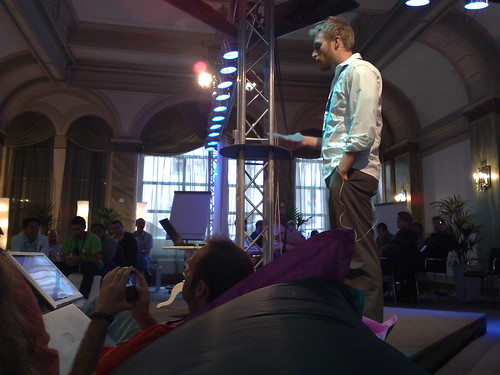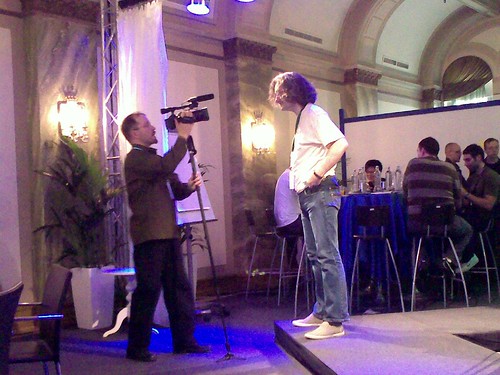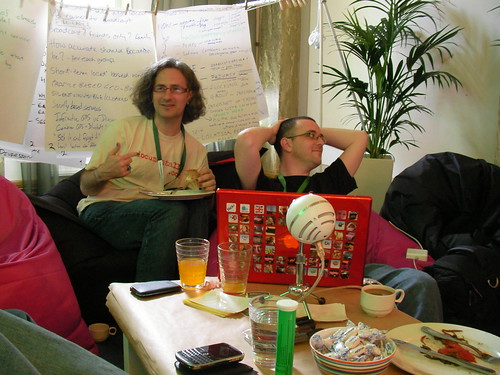 There’s been a whole load of talk in the last few days, following on from the financial crash, saying that ‘Web 2.0 is dead‘.
There’s been a whole load of talk in the last few days, following on from the financial crash, saying that ‘Web 2.0 is dead‘.
Q #1 – what’s Web 2.0? Well, here’s the wikipedia page for it. For our purposes as musicians, it describes the use of the web for collaboration, conversation and creative empowerment, as contrasted with the old model of broadcast, one-way traffic, competitive, aggressive sales-driven stuff…
As the very wise DanLight says here, the people saying ‘web 2.0 is dead’ are actually describing a facet of the tech industry built around web 2.0 resources that is now in deep shit because its funding model is based on venture capital. VC money is deeply hooked into the world of money-markets, credit, banking and all those financial institutions who’ve finally realised that gambling can go very wrong even if you’re not in Vegas.
Clearly, the use of the web as a vehicle for collaboration and conversation is alive well and growing daily. The number of people who ‘get it’ is still growing, and loads of musicians now realise that with a little bit of care, attention and respect, their relationship with their audience can shift from being one of being “big-box producers throwing product at faceless consumers for money”, to being one of arts patronage, support and friendship.
So, just to be perverse at the Web 2.0 funeral party, I thought I’d spell out a few first principles for musicians:
- Talking to your audience doesn’t cost big money but it does take time. In order to get the value from social media, we need to invest time in communicating with our audience. The equation is a fairly simple one – if you spend time talking to your audience about what you do, they will
- understand you better
- feel like they know you better
- be able to explain what you do to their friends better (peer to peer advocacy, if you will) and
- be FAR less likely to view your ‘art’ as something disposable to be thrown away on a P2P sharing platform.
- Broadcasting over social media networks stands out like a dead sheep on a bowling green. People who try and use social networking sites and tools for 90s-style broadcast look really effing stupid. You become like the dude at the party who goes from group to group, looking for an audience,but leaves without even knowing anyone’s name. A HUGE part of web 2.0 for musicians is learning how to listen. I’ve met SO many fascinating people through the web, through talking to people on line, and many of them are now advocates for my music. I’m not friends with them because of that, but it stands to reason that people who are engaged by the ‘soundtrack to the inside of my head’ are going to be people I’m likely to like. My audience is almost always comprised of people I want to go out for dinner with and chat to.
- If you don’t ‘get it’, learn from someone who does. Look, let’s be honest, a lot of people who come from a record company background [where ‘we’ make music and ‘they’ sell it for us] really struggle to understand how this works. If that’s you, GET SOME HELP. That help can come just by observing how people who do it well do it, or it could be that you hire someone to help you out. Increasingly, I’m working with bands and indie labels on strategy for social media engagement. There is no one way to do it, but there are principles to be applied in your setting. And if you don’t get it, you can end up looking like a dick. Hiring someone for a day to help you set up the right services, talk through some strategy and get you hooked up with a like-minded community that will help you move forward will be a hell of a lot cheaper than an 8th of a page ad in the back of Q magazine, and do you 50 times as much good.
- What you’re ‘selling’ is so much bigger than the music on your CD. Think about the last time you bought a CD just because you heard a track on the radio. You didn’t know who or what it was, you just heard it and had to own it because it was so good. Been a while, huh? No-one does that any more. People are entranced by stories, and even more so, like to buy music by their ‘friends’. Even though I put ‘friends’ in inverted commas, there’s no duplicity here. Your audience become people you know, people you talk to, people who tell their friends about YOU not just your music. And you telling your story in your own words gives them the story to tell.
If your first response to this is ‘but will it make them buy more CDs?’, go back and read it again. And this time, read it because you need to know it, not because you want to disprove it so you can nestle back into ‘busness-as-usual’ safe in the knowledge that the internet is still full of know-it-all nerds who can’t actually play an instrument, but like to talk as though they can. This is all a long way from the music forums of the late 90s. This isn’t about being top dawg in a kennel of bass-nerds, it’s about inviting people who are interested in what you do to engage with it on whatever level helps them to get more from it.
I don’t know about you, but I want my music to mean something to my audience. I want to help them to find that meaning in it. I don’t need to define the meaning, just to facilitate them finding it for themselves. Next post will look at more ways of doing that, and maybe a case study or two…

 And the last session was Join and Collaborate – CT did a nice job of setting it up with his facilitator bit, but this was where the Nokia-ness of the session first impressed itself upon the kind of discussion we had.
And the last session was Join and Collaborate – CT did a nice job of setting it up with his facilitator bit, but this was where the Nokia-ness of the session first impressed itself upon the kind of discussion we had. Session 3 (session 2 for me) was the Entertainment one outlined in
Session 3 (session 2 for me) was the Entertainment one outlined in  So the format of the Friday was intro, followed by four sessions –
So the format of the Friday was intro, followed by four sessions – I’ve just spent 3 days geeking out in Helsinki, at the
I’ve just spent 3 days geeking out in Helsinki, at the